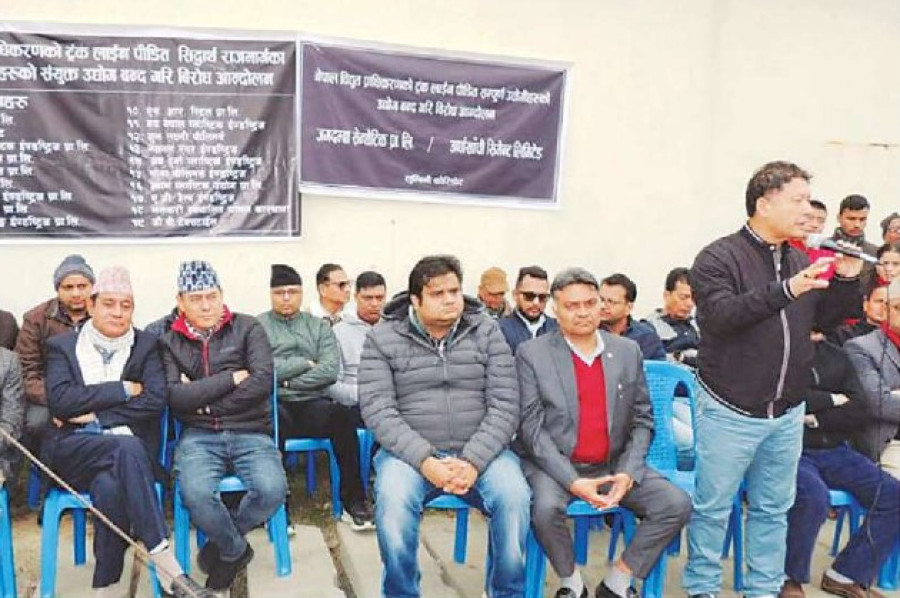National
Panel formed to settle dispute over power bills due to be paid by factories
Nepal Electricity Authority chief expresses resolve to recover the due amounts with power supply to two dozen factories being cut off for two weeks.
Post Report
The government on Tuesday formed a high-powered committee to probe the ongoing dispute over dues to be paid by a number of factories that had power supplied to them via dedicated and trunk lines.
Nepal Electricity Authority and the private sector are at loggerheads over the issue as industrialists have refused to pay the extra bill as claimed by the NEA. Traders argue that they were unfairly charged premium rates without supplying power round-the-clock as promised.
Amid claims and counter claims, the Cabinet on Tuesday formed a three-member committee headed by former Supreme Court Justice Girish Chandra Lal to conduct an investigation into the issue and submit a report, according to Rekha Sharma, minister for communication and information technology who is also the government spokesperson.
Two joint secretaries—one each from the industry and energy ministries—will be the members of the committee, she said.
The Cabinet also decided to resume power supply to two dozen factories that were earlier cut off electricity by the NEA to build pressure to recover the dues.
According to the NEA, they are the factories whose claimed unpaid dues exceed Rs50 million each.
Earlier, the Federation of Nepalese Chambers of Commerce and Industries had demanded the formation of the high-powered body to settle the issue.
The Cabinet decision comes as a major setback for the NEA, which, on Tuesday, announced that it had made arrangements for consumers who used electricity from dedicated and trunk lines in the past to pay the claimed dues in instalments within five years.
In a notice on Tuesday, the state-owned power utility said a special arrangement had been made to allow consumers to pay dues in instalments within 60 months. The utility asked such consumers to submit an application at the distribution centres concerned for the instalment arrangement within 30 days.
When the general public faced prolonged power cuts in the country until a few years back, such factories were provided round-the-clock electricity with dedicated feeder and trunk lines.
A dedicated feeder involves the supply of electricity through a separate line directly from a substation. On the other hand, a trunk line delivers electricity from the transmission line to the factory by installing a transformer inside the factory itself.
NEA claims that the arrangement was made for some factories on the condition that they pay premium tariff (more than normal tariff) but factory owners are claiming they wouldn't pay the claimed dues as they didn’t receive regular supply.
According to the NEA, it needs to recover over Rs22 billion in unpaid dues from 61 consumers, with one—Jagdamba Steel—alone owing as much as Rs4.14 billion.
In order to recover the claimed dues, the NEA also extended an olive branch to the factories, giving them a five-year timeline to pay the dues in instalments.
“With the country’s economy struggling and amid claims that businesses are not doing well, we announced this facility as a win-win strategy for both the NEA and the industrialists,” said NEA spokesperson Suresh Bahadur Bhattarai. “This is only for those who have consumed electricity via trunk and dedicated lines.”
Earlier in the day, NEA Managing Director Kul Man Ghising, who is determined to recover the dues, made it clear that there was no choice for the factory owners but to pay the dues.
Speaking at the infrastructure development committee of the House of Representatives on Tuesday, Ghising said that the factories that consumed electricity from dedicated and trunk lines must pay the bills based on the premium tariff.
From the perspective of justice to the general public who endured prolonged power cuts, the factories that were supplied round-the-clock electricity must pay a higher tariff, he reasoned.
According to the power utility, even though those factories paid regular bills, they did not pay additional tariffs.
“Various agencies including the Commission for Investigation of Abuse of Authority have told us to recover the dues,” Ghising said. “The Electricity Regulatory Authority has also given us written instruction to recover the dues.”
On the other hand, the industrialists refusing to pay the claimed dues say the NEA must first produce evidence that they were supplied round-the-clock electricity during the load-shedding period.
Amid divergent claims by the NEA and the industrialists, the Federation of Nepalese Chambers of Commerce and Industry said in a statement on December 25 last year that the issue should be settled through a high-powered commission.




 16.12°C Kathmandu
16.12°C Kathmandu













